In the overwhelmingly agricultural region of Brittany in western France, Triskalia is a big name. It employs 4,800 people in its core business of services for livestock farmers and its food processing and retailing businesses, many of whose brands are household names in the country. It even has an environmental policy.
But on 22nd September 2016, the social security tribunal in Saint-Brieuc in northern Brittany ruled that the company's animal feed business, Nutréa Nutrition Animale, must pay two former employees over 100,000 euros each to compensate them for invalidity caused by exposure to pesticides at work. It was the final stage in a pioneering case to gain recognition that pesticide exposure and the suffering it causes are occupational hazards.

Enlargement : Illustration 1

Laurent Guillou and Stéphane Rouxel were machine operators who unloaded lorries bringing raw materials to Nutréa's factory at Plouisy, near Guingamp. First in 2009, then again in 2010, they were exposed to dust from grain that had been treated with pesticides by Eolys, one of three agricultural cooperatives that merged to form Triskalia in 2010.
The consignments delivered to the factory had been dosed with enough pesticide to render them toxic. In the first case, the supplier used Nuvan Total, a pesticide banned since 2007. Nuvan is a trademark belonging to Amvac Chemical Corporation.
Guillou reported feeling burns on his face and scalp and having breathing problems. Since the industrial accidents, he and Rouxel both suffer from multiple chemical sensitivity (MCS), which means that any contact with chemicals, even ones as ordinary as household cleaners, sets off headaches, nausea, burning skin, coughing and both abdominal and muscular pains.
Guillou cannot bear any smell and now avoids going out. He has given up his hobbies of hunting, fishing and coaching a local football team. The doctor designated to evaluate Rouxel's state of health reported that “he is currently sensitive to domestic cleaning products”. He also hardly goes out, and his wife says he is “very anxious and nervous”. He was unable to complete a work experience scheme to get a new job as it involved contact with detergents.
After the second accident the two men took out a lawsuit. Then in 2011, Nutréa fired them as unfit for work. They began a procedure for wrongful dismissal, in which no judgement has yet been given. Their mutual health insurer, Mutuelle Sociale Agricole, recognised that they had been victims of an industrial accident. And they were supported by the trade union federation Solidaires.
Their legal claims culminated in 2014 with a judgement of inexcusable misconduct on the part of their employer. They were the first non-farm agricultural workers to obtain recognition of such misconduct involving exposure to pesticides. And the tribunal on 22nd September, awarding them damages, became the first court to recognise the MSC syndrome.
“This decision is another victory for Stéphane and Laurent who have waged a constant fight for nearly seven years now to get their illness recognised, demand damages and denounce the health and environmental scandal that the massive and irresponsible use of pesticides in the agro-food industry represents today,” Solidaires said in a statement. Both judicial rulings put the spotlight on working conditions in the conservation and transformation of agro-food products, where workers are often the forgotten victims of exposure to chemical substances.
But the cases of these two men are not isolated incidents. In 2009 France's labour inspectorate, the Inspection du Travail, recorded several cases of Nutréa employees showing serious symptoms after chemically-treated wheat had been delivered to the factory. They had not been informed of the risks or trained in wearing protective clothing or using protective equipment.
Over April and May 2009 there were five instances of employees reporting serious symptoms. In 2010, eleven cases were reported during February and March. François Lafforgue, a lawyer representing several former Triskalia employees, said that “working conditions were deplorable in this company during those years. Former employees had to go to court to obtain compensation, which is unusual given the [extent of the] disaster.” It should be simpler for affected employees to pursue their cases, he added.
Unlike Guillou and Rouxel, two other former employees at the same factory, Pascal Brigant and Claude Le Guyader, failed to obtain recognition that they were victims of an industrial accident. And in March 2014 Gwénaël Le Goffic, a delivery driver at the Plouisy factory, hanged himself in a silo two months after being exposed to dust from medicated pig food he was unloading. A year later, his suicide was finally recognised as an industrial accident.
And even Guillou and Rouxel had a rocky road through the judicial apparatus. Their initial criminal lawsuit was closed with no further action a full five years after they initiated it. They finally won by taking a civil suit before an examining magistrate.
The conditions at Triskalia deserve closer attention, particularly because the company is a powerful operator in the powerful Breton agricultural sector. Founded in 2010 through the merger of three cooperatives, Coopagri, Eolys and CAM 56, it had a 2014 turnover of 2.1 billion euros. Its retail branch includes 250 outlets under the insignia Magasin Vert and Point Vert, and its food products retail under the brands Paysan Breton, Régilait, Mamie Nova, Prince de Bretagne, Ronsard and Planète Positive.
No one from Triskalia was immediately available for comment after the ruling. But immediately before the judgement the company told Le Croix newspaper that it was “obviously moved” by the human plight of its two former employees. But it insisted that its workers “only handle packaged products, equipped with work clothes, safety shoes and gloves”. It added: “Training in the prevention of risks is organised in groups of 8 to 10 people every three years.”
------------------------------------------------------------------------
The French version of this article can be found here.
English version by Sue Landau


